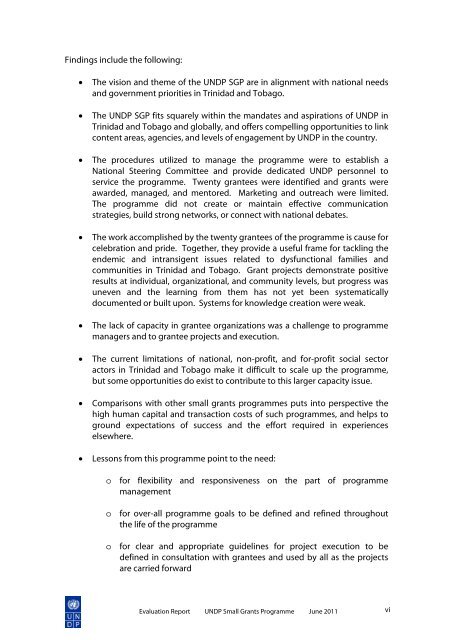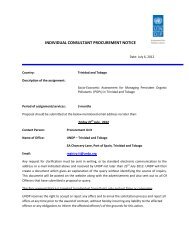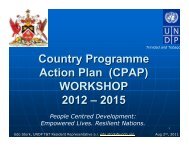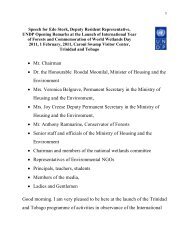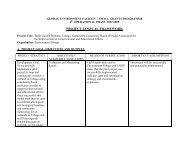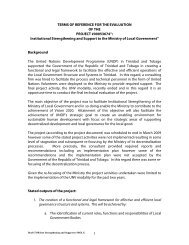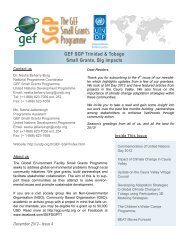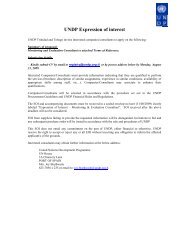UNDP Small Grants Programme Evaluation Report June 2011
UNDP Small Grants Programme Evaluation Report June 2011
UNDP Small Grants Programme Evaluation Report June 2011
Create successful ePaper yourself
Turn your PDF publications into a flip-book with our unique Google optimized e-Paper software.
Findings include the following:• The vision and theme of the <strong>UNDP</strong> SGP are in alignment with national needsand government priorities in Trinidad and Tobago.• The <strong>UNDP</strong> SGP fits squarely within the mandates and aspirations of <strong>UNDP</strong> inTrinidad and Tobago and globally, and offers compelling opportunities to linkcontent areas, agencies, and levels of engagement by <strong>UNDP</strong> in the country.• The procedures utilized to manage the programme were to establish aNational Steering Committee and provide dedicated <strong>UNDP</strong> personnel toservice the programme. Twenty grantees were identified and grants wereawarded, managed, and mentored. Marketing and outreach were limited.The programme did not create or maintain effective communicationstrategies, build strong networks, or connect with national debates.• The work accomplished by the twenty grantees of the programme is cause forcelebration and pride. Together, they provide a useful frame for tackling theendemic and intransigent issues related to dysfunctional families andcommunities in Trinidad and Tobago. Grant projects demonstrate positiveresults at individual, organizational, and community levels, but progress wasuneven and the learning from them has not yet been systematicallydocumented or built upon. Systems for knowledge creation were weak.• The lack of capacity in grantee organizations was a challenge to programmemanagers and to grantee projects and execution.• The current limitations of national, non-profit, and for-profit social sectoractors in Trinidad and Tobago make it difficult to scale up the programme,but some opportunities do exist to contribute to this larger capacity issue.• Comparisons with other small grants programmes puts into perspective thehigh human capital and transaction costs of such programmes, and helps toground expectations of success and the effort required in experienceselsewhere.• Lessons from this programme point to the need:o for flexibility and responsiveness on the part of programmemanagemento for over-all programme goals to be defined and refined throughoutthe life of the programmeo for clear and appropriate guidelines for project execution to bedefined in consultation with grantees and used by all as the projectsare carried forward<strong>Evaluation</strong> <strong>Report</strong> <strong>UNDP</strong> <strong>Small</strong> <strong>Grants</strong> <strong>Programme</strong> <strong>June</strong> <strong>2011</strong>vi


